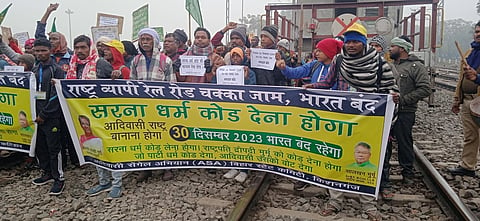
New Delhi- Former Member of Parliament and National President of the Adivasi Senegal Abhiyan, Salkhan Murmu, currently recovering from an illness in Delhi, has expressed his thoughts on the political landscape concerning the tribals, particularly in Jharkhand, in the upcoming 2024 Lok Sabha elections.
In a detailed statement on Monday, Murmu stressed on the plight of tribal communities amidst the dominating NDA versus INDIA discourse, lamenting their relegation to mere vote banks by major political parties.
"Most of the media only talks about NDA versus India, leaving little space for the tribals. Whichever party wins, the defeat of the tribals is certain," stated Murmu.
He emphasized key tribal agendas, including land preservation, protection of tribal laws such as the Chotanagpur Tenancy (CNT) and Santhal Pargana Tenancy (SPT) Acts, promotion of the Santali language, and addressing caste-based challenges faced by the community. Murmu stressed the need for safeguarding tribal rights and constitutional provisions.
Regarding allegations against political figures, Murmu provided a nuanced perspective, differentiating between Arvind Kejriwal and Hemant Soren. He stated, ""Arvind Kejriwal and Hemant Soren are both accused in a money laundering case, but it is not fair to compare the two. Kejriwal is seen as promoting good governance and being corruption-free, whereas the Soren family is surrounded by allegations of loot, lies, and corruption. The Soren family has sold Jharkhand, including Marang Buru to the Jains, and has opposed the Santhali language and Ol Chiki script. They have taken evasive actions on the Sarna issue, using 1932 as a reference for domicile. They have also worked on dismantling the CNT/SPT laws. Despite the father and son holding the Chief Minister position five times, they have done nothing concrete for tribal interests", Murmu emphasized.
In the statement, Murmu accuses the BJP of lacking an understanding of tribal issues and alleges that the party aims to forcibly convert tribals into Hindus. He points out the absence of support for the Sarna Dharma Code, which is significant to tribal communities, as evidence of this agenda.
Murmu suggests that Hemant Soren's party may benefit from this stance, insinuating that it presents an opportunity for the party to secure tribal support.
Furthermore, Murmu criticizes the Jharkhand Mukti Morcha (JMM) for allegedly betraying tribal interests despite receiving substantial votes from the community. He highlights various social issues prevalent among tribal societies, including drug addiction, superstitions, and anti-women mentality, and accuses the JMM of failing to address these challenges effectively.
Murmu also accuses the party of neglecting to tackle issues such as witchcraft, the buying and selling of votes, and the need for constitutional and democratic reforms in tribal self-governance systems like the Majhi Pargana.
Murmu welcomed Rahul Gandhi's pledge to recognize the Sarna Dharma Code during the election campaign, viewing it as a positive step towards tribal representation.
The Sarna religion is a unique faith followed by nature worshippers. Its main beliefs are centered around water, forests, and land. Sarna followers pray to trees and hills and focus on protecting forests. They do not worship idols or follow the caste system, and they do not believe in concepts like heaven and hell.
Most Sarna followers live in tribal areas of Odisha, Jharkhand, Bihar, West Bengal, and Assam.
Experts say that with the world focusing on reducing pollution and protecting forests, native communities like Sarna followers should play a key role. Recognizing Sarnaism as an official religion is important because it emphasizes the protection of nature and the environment.
Over the past three years, Adivasi Senegal Abhiyan (ASA) has orchestrated a series of protests, significantly disrupting rail and road communication in five states in support of their demand for the Sarna Dharma Code.
The Sarna Dharma Code, according to Murmu, holds the lifeline for approximately 15 crore nature-worshipping tribals in the country, serving as a crucial element for their existence, identity, and active participation in society.
The provision allowing for the recognition of Sarna Dharma Code existed until the 1951 census but was later removed by Congress. The former MP argues that in the 2011 census data, 50 lakh tribals identified as Sarna, surpassing the 44 lakh Jains, which highlights the urgency of protecting tribal fundamental rights, deeming the denial of religious freedom to tribals a constitutional crime
You can also join our WhatsApp group to get premium and selected news of The Mooknayak on WhatsApp. Click here to join the WhatsApp group.